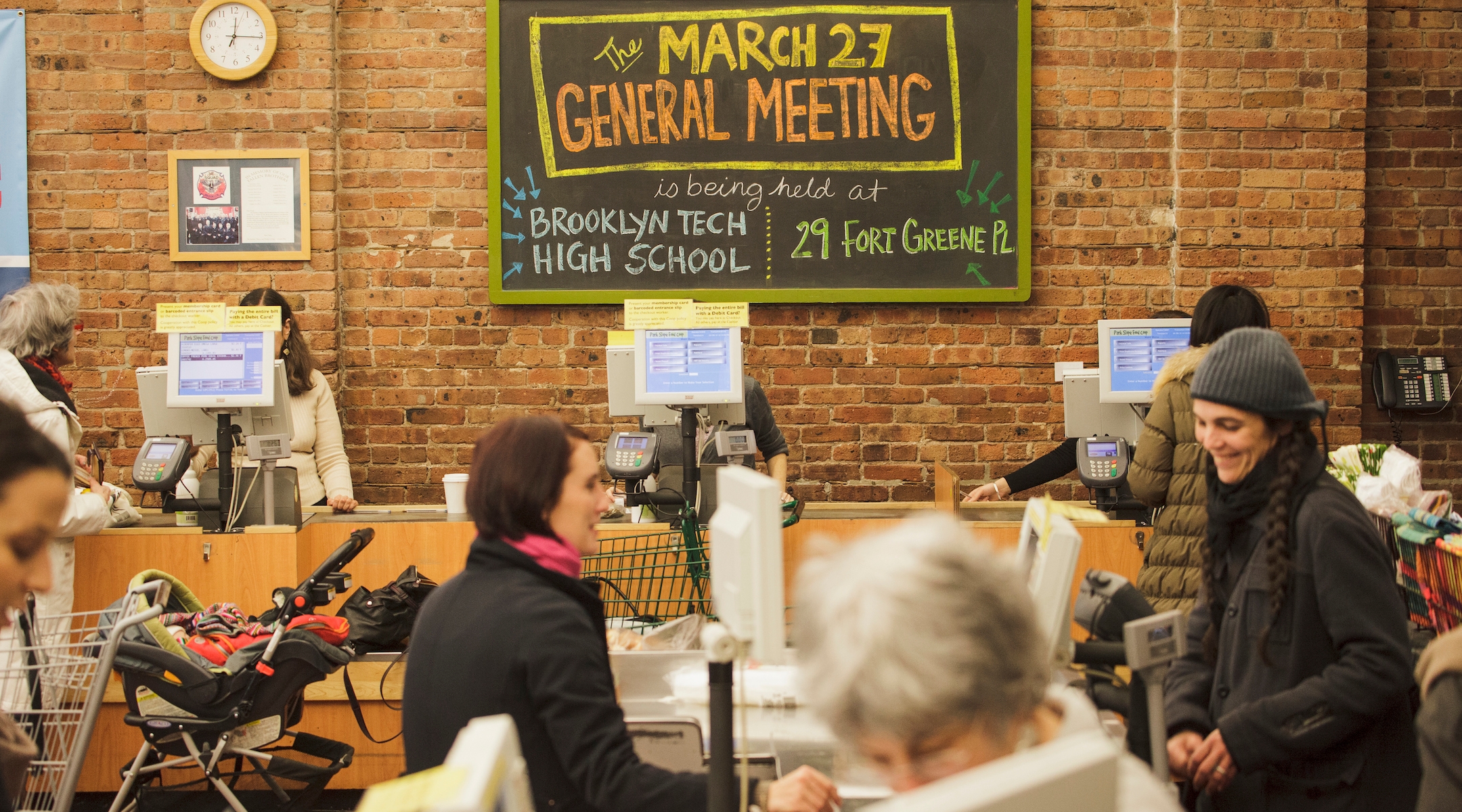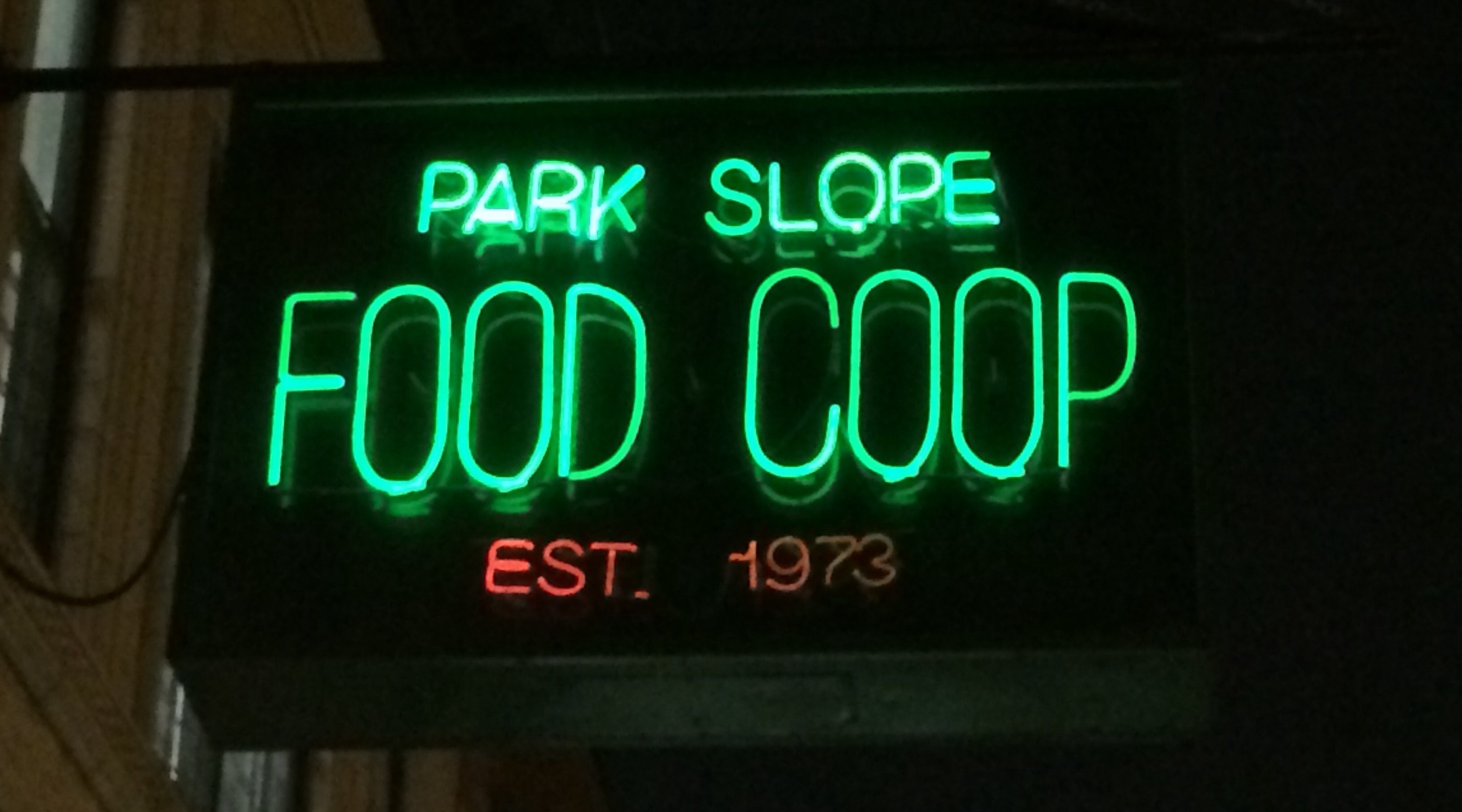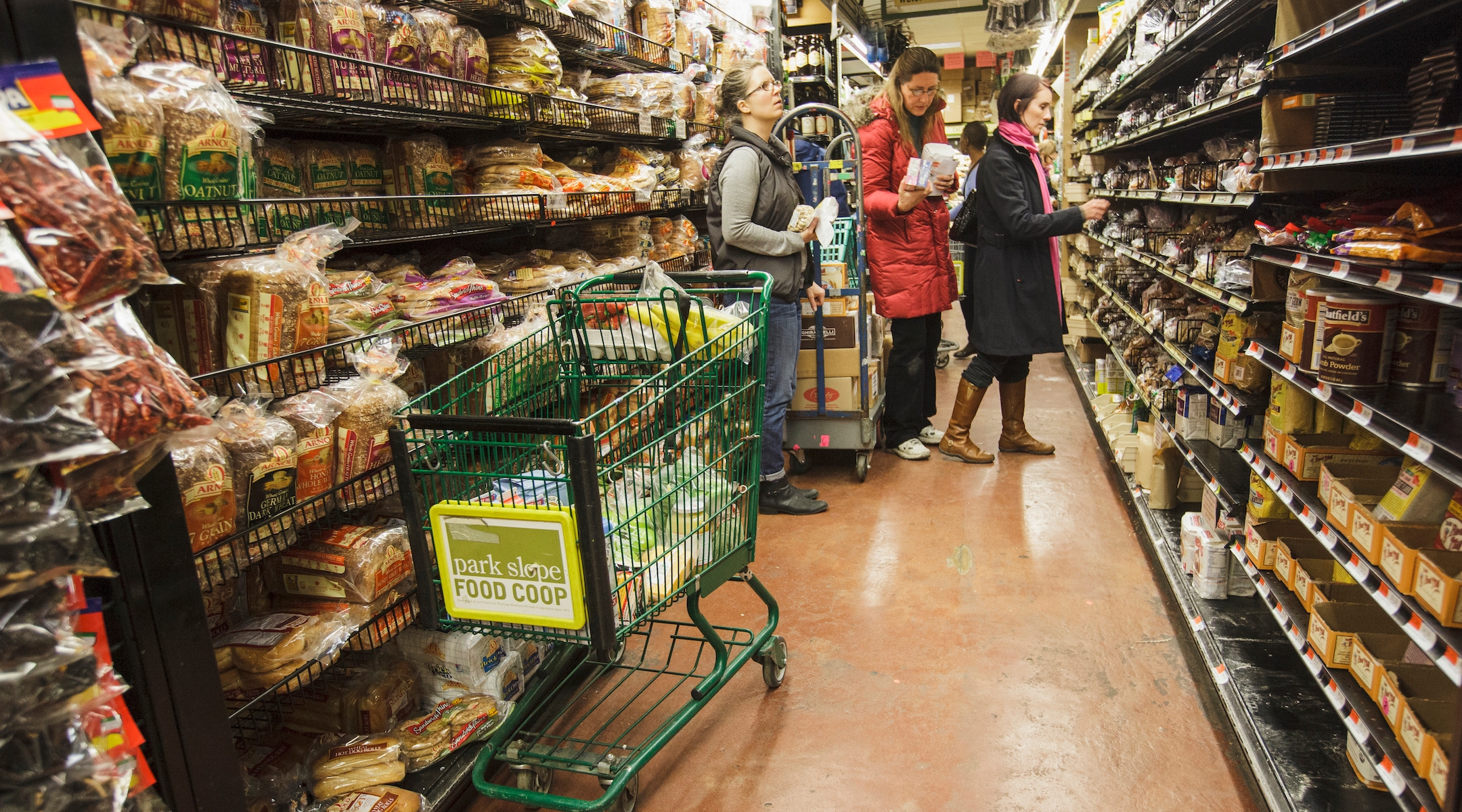When Sondra Shaievitz moved to Brooklyn’s leafy Park Slope neighborhood in 1993, part of the draw was the Park Slope Food Coop, a member-owned and operated grocery store that, to its devotees, serves as a community and an exemplar of the borough’s progressive ethos.
Shaievitz, a vegan professional energy healer who specializes in “space clearing” apartments, fit right in. Nearly every day for 31 years, she stopped by to pick up fresh produce or just experience some neighborly camaraderie.
“The co-op is such a special place — to me, it was a real, uplifting place,” Shaievitz recalled. “Everybody works together, and we cooperate, and everyone’s so friendly and seem to care about each other. It was just such a pleasant place to be.”
But now, she barely goes in. At the grocery store she once saw as a second home, she says, she has been verbally abused and feels isolated — all because of the Israel-Hamas war. At one point, she recalled, a man stood in front of her screaming, “She’s a Zionist” to anyone who would listen.
“I used to wind up going there at least five days a week — a lot of people did that,” said Shaievitz, who is Jewish. “Now, I try to go as long as I can without having to go back. I try to stock up when I go and that makes me very sad.”
She isn’t alone in her anguish. For the past year, the Park Slope Food Coop has been riven by debates over Israel, Gaza and the Middle East war that began on Oct. 7, 2023. A contingent of members has pushed the store to boycott Israeli goods, and the issue has dominated the co-op’s internal politics ever since, sparking fights at its monthly general meetings, in the pages of its newsletter and, sometimes, within the confines of the co-op itself, with members shouting epithets at each other.
The co-op is far from the only progressive space to be torn asunder by fights over the Gaza war. But to its members, this one feels different, if only because community is one of the co-op’s guiding principles, and the word “cooperative” is literally part of its name. The co-op is famous for being owned and staffed by its members, with just a few paid employees. The institution’s policies — on anything from masking to food sourcing — are discussed at monthly general meetings, put up for discussion with committees (and subcommittees) and eventually brought to a membership-wide vote.
Now, some Jewish members feel that arguments over the war are violating the co-op’s half-century history of spirited discussion amid a commitment to welcoming its members and opposing discrimination.
“It’s all different cross sections of New York, different types of people coming together, working together to make this thing run and have great, high-quality produce at low cost,” said Jonathan Aranov, a 28-year-old Park Slope resident and co-op member.
For him, the movement to boycott Israel has begun dismantling that vision. “It should be all about community,” he said. “This was my first taste of something driving a wedge in that community.”
The current movement to boycott Israeli goods began on Oct. 31, 2023, weeks after Hamas’ Oct. 7 attack launched the war. A member’s suggestion at a monthly general meeting that the co-op implement a Boycott, Divestment and Sanctions policy against Israel, known as BDS, was “met with applause,” according to the co-op’s internal news site, The Linewaiters Gazette.
This is not the first BDS proposal at the co-op. In 2012, there was a referendum to vote on whether to vote on a boycott, which failed. Over the years, the issue has resurfaced several times but hasn’t gained traction.
Now, nearly a year after that first suggestion of a boycott, the debate is ongoing. At the end of 2023 and throughout the first half of 2024, members of a group called Park Slope Food Coop for Palestine began canvassing outside the doors of the co-op, calling on members to support the boycott. Since last year, Shaievitz said, the general meetings, whose vibe used to remind her of the bucolic TV show “Gilmore Girls,” have been focused on whether or not to boycott, making the space “toxic.”

A sign above the check-out at the Park Slope Food Coop in Brooklyn advertises the next date and location at the general meeting. (James Leynse/Corbis via Getty Images)
In the co-op’s gazette, which publishes content every three weeks, nearly every issue has contained open letters written by impassioned members either opposed to or supporting BDS. In February, the editors put a note at the top of the “Letters” section noting there would be a month-long pause in letters related to the Middle East in order to review the submissions policy, testifying to the sheer volume of letters received.
A closely watched June campaign for two seats on the co-op’s five-member board of governors pitted pro- and anti-boycott slates against each other.
Shaievitz and Ramon Maislen, a Jewish member who has belonged to the co-op for 13 years, ran under the umbrella of an anti-BDS WhatsApp group and listserv they created, called “Coop 4 Unity.” But they lost to two candidates endorsed by the Park Slope Food Coop for Palestine group, Tess Brown-Lavoie and Keyian Vafai.
“This is harming our food co-op, it’s ripping the co-op apart,” Shaievitz said. “This isn’t some kind of political action community and we’re not going to solve the Middle East. Our platform was the health of the co-op and making sure all of our members feel welcome and safe.”
Brown-Lavoie declined to comment for this article; the New York Jewish Week was unable to reach Vafai. But both told the co-op’s gazette that they support BDS, and Vafai has been calling for an end to Israel’s military campaign since shortly after Oct. 7.
Vafai, who is Muslim, attended a Jewish Voice for Peace rally in Washington, D.C. on Oct. 18, 2023 alongside his Jewish girlfriend. He called on Israel to “stop dropping bombs on Gaza immediately,” according to the Baffler, and cited “the ongoing treatment of all Palestinian people, including the causes of the military operation, like the blockade of Gaza.”
Some Jews say they’ve experienced outright hostility at the co-op: Maislen said another member told him that “because I’m a Zionist, I’m incapable of empathy.” According to letters to the editor in the gazette, both pro- and anti-BDS members have been called Nazis.
Another member, who is Israeli and asked to remain anonymous, fearing for her safety, said she was discussing the BDS vote with a friend during her work shift at the co-op when she was interrupted by another member with a “hateful monologue” accusing her of lacking empathy and complicity in “genocide,” as well references to antisemitic tropes about Jews and money.
As the Israeli member tried to explain her position, she recalled, the other member backed away, telling her, “I can’t stand next to you, you smell of Palestinian blood.”
For a few months throughout the winter, the pro-BDS canvassers — or the worry about encountering them — “totally affected every interaction,” Aranov said. He started steeling himself to go to the store, rehearsing what he might say if he was approached, debating whether or not he even wanted to go in the first place.
“Every time you want to go grocery shopping, you think, ‘Am I emotionally ready for this?’” he said. “I’ve had to remind myself that I’m living in Brooklyn, which is already going to be a very progressive neighborhood, and I’m going to the co-op, which is going to be an even more progressive institution.”
He added, “Unfortunately, much of the progressive movement has shifted into this insidious anti-Israel movement.”

Neon Sign at Night: Park Slope Food Coop Est. 1973. (Keith Getter/Getty Images)
Now, the pro-BDS group — which has more than 1,000 signatures, according to its website — is putting plans in motion to hold a BDS vote at the co-op. It has proposed several related actions, including pushing for the co-op to adopt “hybrid” general meetings so that space constraints don’t end up delaying a membership-wide vote. They are also hoping to reduce the current 75% majority needed to approve a boycott — which was instituted in 2012 — to a simple majority.
If a boycott does happen, it may be hard to discern on the co-op’s shelves. Out of more than 5,000 items the co-op sells, there are only a handful of Israeli goods — mainly varieties of Sabra hummus, a brand of shampoo and conditioner and tahini. In certain seasons, the co-op may sell produce grown in Israel including peppers, carrots and clementines.
Still, the Park Slope Food Coop for Palestine group, which declined to comment for this article, insists that a boycott is necessary “to take a principled stance against the genocide” and to “to materially enforce economic pressure on Israeli companies complicit with apartheid,” according to the group’s website. Supporters also hope that the co-op’s outsized fame will influence other food co-ops to institute their own boycotts.
“The co-op is a unique institution with an equally unique history as one of the largest and oldest food co-ops in the country,” the group said in an open letter. “Adding our voice to this issue will not go unnoticed, and will set a positive example for other food cooperatives in and out of New York City.”
The pro-boycott movement includes a number of the co-op’s Jewish members. In the July 23 issue of the gazette, which featured a series of letters debating whether BDS is antisemitic, some Jews wrote that a boycott aligns with the co-op’s values.
“I’ve always valued the Coop as not only a grocery store but a place to implement our visions of justice in the world,” wrote Judith Loebl, noting that she was the child of Holocaust survivors. “Boycotting Israeli products is a nonviolent method of creating constructive pressure that supports Palestine, and as such seems like a perfect fit for the Coop.”
Aranov countered, in his own letter, “The BDS movement, which singles out the Jewish state and denies its right to exist, is antisemitic. Please do not allow antisemitism to be normalized at the Coop.”
Several Jewish members told the New York Jewish Week they would resign if a vote were held. But regardless of what happens on the issue in the future, some said, a cherished community space has been tainted.
“It has changed the energy to a certain degree,” Maislen said of the member-driven BDS movement. “It makes me not want to go into the co-op, and I used to love going to the co-op.”
The New York Jewish Week brings you the stories behind the headlines, keeping you connected to Jewish life in New York. Help sustain the reporting you trust by donating today.





